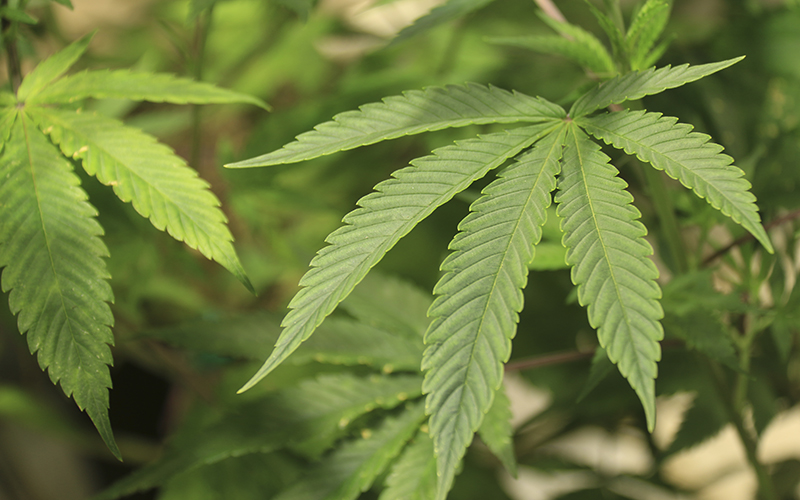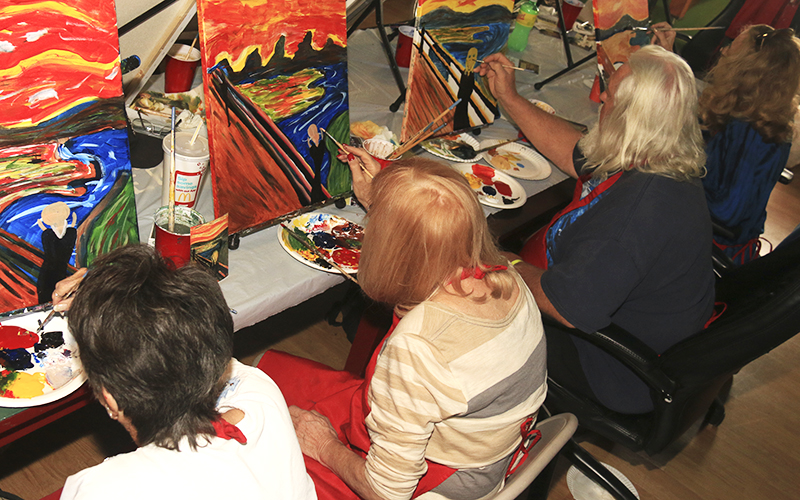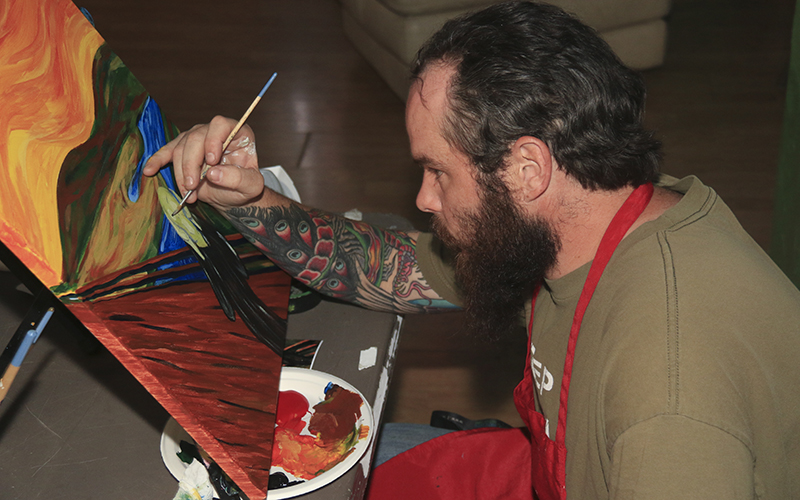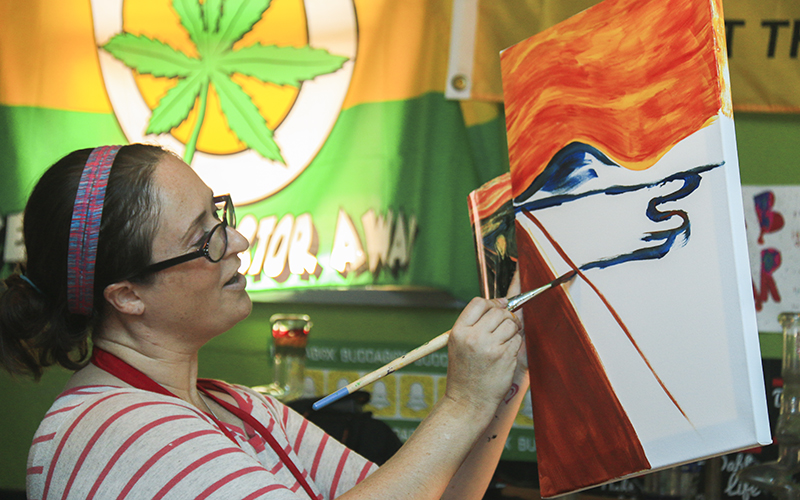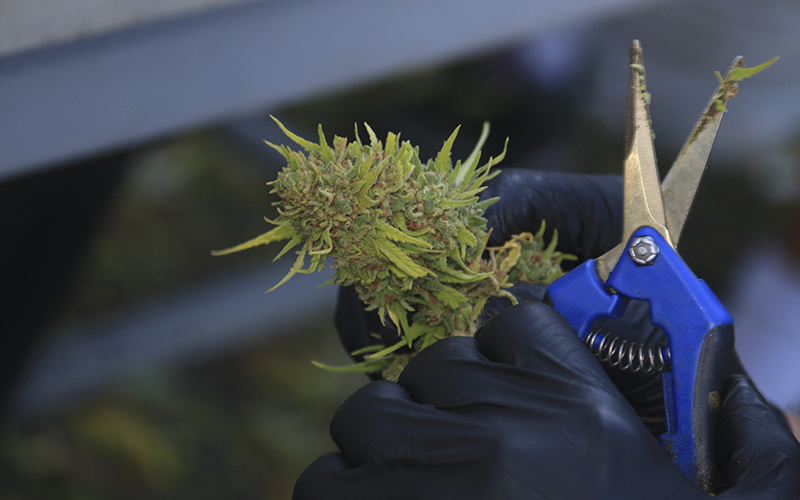TUCSON – The aroma of hot pizza fused with lingering marijuana smoke and Mick Jagger’s repeated cadence of “I can’t get no… sa-tis-fac-tion.”
Posters of the “Periodic Table of Cannabis”, a “DONT [sic] TREAD ON WEED” Gadsden flag parody and other marijuana-themed pop culture memorabilia decorated the walls of the 420 Social Club.
As Jagger sang on, authorized medical marijuana patients painted their own versions of “The Scream” by Edvard Munch.
“Painting in a large group of people requires concentration and the ability to maintain your anxiety and your hypervigilance and, you know, maybe your increased fear of just being surrounded,” said Ricardo Pereyda, an Army veteran who started this monthly Buds and Brushes program for military veterans and others as “cannabis art therapy”.
Pereyda is an enthusiastic supporter of Proposition 205, which comes up for a vote on Nov. 8 and, if passed, will legalize recreational marijuana in Arizona.
He believes, from his own experience, that marijuana is a safe and effective treatment for post-traumatic stress disorder (PTSD) in veterans. And even though veterans with PTSD can already legally obtain medical marijuana under Arizona’s medical marijuana law, Pereyda supports Prop. 205 because he believes that veterans with PTSD who use marijuana under the state medical marijuana law are penalized by the state, which charges what he views as exorbitant licensing costs, and by the U.S. Department of Veterans’ Affairs, which he says imposes restrictions on patients who report using marijuana.
He said his activism is driven by a desire to see the VA itself provide penalty-free marijuana to veterans suffering from PTSD.
While several veterans interviewed by Cronkite News support researching the medical effects of marijuana for PTSD treatment, they have mixed feelings about the legitimacy of Prop. 205.
Proponents of Prop. 205 have released a video advertisement featuring Marine veteran Bruce Laird, who has PTSD, urging the passage of the measure to “help veterans just like me.”
The slogan on the ad says “YES on 205. Legalize Marijuana To Help Veterans”.
In a competing ad on Facebook, the No on Prop. 205 campaign says medical marijuana is already available to veterans with PTSD through Arizona’s established medical marijuana law. “Our veterans suffering from PTSD can get marijuana quickly and legally,” the ad says.
From opioids to cannabinoids
Pereyda said he served in the Army’s military police corps in Iraq for 12 months in 2005.
Although he refused to talk about his wartime experiences during recent interviews with Cronkite News, Pereyda said in a 2015 video interview that the situation in Iraq was “chaotic”.
He watched military contractors hanging from a bridge in Fallujah, he said in the video, his platoon underwent ambushes and attacks and he watched helplessly as a shot-down Apache helicopter burned with passengers inside.
Now 34, Pereyda lives in Tucson and works in a marijuana dispensary.
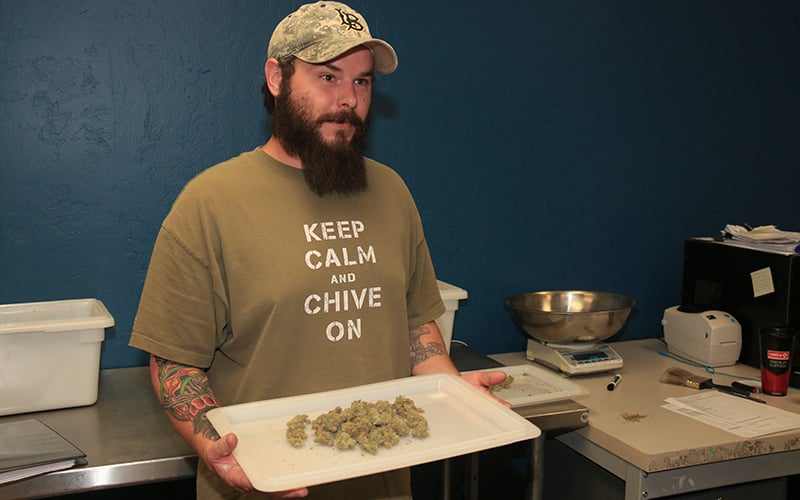
Ricardo Pereyda, a veteran who says he has combat-related PTSD, carries a tray with one ounce of marijuana at a medical marijuana grow house in Tucson. Under Prop. 205, any person 21 years of age or older would be allowed to possess and use up to one once of marijuana. (Photo by Brian Fore/Cronkite News)
Pereyda maintains that marijuana has eased the symptoms of his combat-related PTSD and physical pain from back and shoulder injuries.
When he returned from Iraq, he drank too much, he said, and got in bar fights. He said some people in the military encouraged the heavy use of alcohol after deployments.
“It doesn’t change when you get back from a deployment,” Pereyda said of his PTSD.
“In fact, it’s worse.”
In 2009, he said, the injuries and PTSD resulted in his medical retirement from the Army.
The VA, he said, prescribed him muscle relaxants and opioids to manage sleep, anxiety and physical pain. As he developed a tolerance to these drugs, he became addicted and abused them, self-medicating to deal with PTSD and physical pain, he said.
The addictions strained his personal life, resulting in divorce and the loss of his home, he said. He eventually ended up living with his parents.
In 2010, Pereyda said, he gave up prescription drugs and alcohol and turned to marijuana to deal with his physical and emotional pain.
“I started using cannabis exclusively for my symptom management and control,” he said.
He even testified at a hearing to add PTSD as a qualifying medical condition for medical marijuana in Arizona. It was added as a qualifying condition in 2015.
As an advocate for Prop. 205, Pereyda said veterans who report their medical marijuana usage to the VA are put on a “watch list.”
Cronkite News could not confirm the existence of such a list.
“There is no VA database or watch list used to track Veterans who use marijuana, but the information about its use is to be recorded in the individual patient’s medical record for clinical use,” John Goodrich, a spokesman for the Veterans Health Administration, wrote in an email. “This information is recorded so VA providers are aware of all prescription and non-prescription products a Veteran reports using so that the provider can develop an optimal treatment plan that serves the best interest of the Veteran.”
Paul Coupaud, a public affairs officer with the Phoenix VA Health Care System, would not comment on the VA’s treatment of veterans who take medical marijuana.
The Veterans Health Administration Directive 2011-004 referred by Coupaud states that VHA providers can’t refer patients for medical marijuana usage or offer opinions on medical marijuana cards or usage.
The VHA directive also states “Possession of marijuana, even for authorized medical reasons, by Veterans while on VHA property is in violation of VA regulation 1.218(a)(7) and places them at risk for prosecution under the Controlled Substances Act.”
This oversight from the federal government, according to Pereyda, is an infringement of veterans’ rights.
Will voters pass Prop. 205?
In the meantime, Rep. Mark Cardenas, D-Phoenix, and other Prop. 205 advocates defended the proposed measure during the Southwest Cannabis Conference and Expo at downtown Phoenix in October.
Cardenas, a Marine veteran, called for the VA to allow testing of marijuana as a treatment for PTSD.
“We as a veteran community want the VA to…allow testing on veterans to combat the symptoms of PTSD,” he said in an interview.
He said PTSD and the side effects of opioids cause veterans to commit suicide. Replacing opioids with marijuana, he said, would be beneficial because marijuana has “no side effects”, no “hallucinogenic effects” and reduces suicidal tendencies.
“There are absolutely amazing medicinal properties of this plant that are helping veterans out there, and the fact that we are not allowing them to access this medication, that’s the real crime,” said Ryan Hurley, a partner with the Rose Law Group, which helped draft and promote Prop. 205.
In October, an Arizona Republic/Morrison/Cronkite News poll of likely Arizona voters found 50.4 percent supported Prop. 205, while 41.6 percent opposed the measure and 8 percent were undecided.
The need for more research
Though anecdotal evidence about the benefits of marijuana in the treatment of PTSD in veterans abounds, there is little research to back it up, many experts agree.
“The benefits of medical marijuana are little understood, largely because there is scant research, which is complicated by required clearance from the U.S. Drug Enforcement Administration,” the Johns Hopkins Bloomberg School of Public Health reported in January.
The National Institutes of Health spent more than $111 million on 281 marijuana-related research projects in fiscal year 2015. Within those projects, $21 million was spent on 49 studies to examine “therapeutic properties of cannabinoids”. According to the National Institute of Drug Abuse, cannabinoids are “chemicals related to…marijuana’s main mind-altering ingredient.”
Share your story
Five human studies on PTSD and cannabinoids are either federally approved or in process.
Veterans in Arizona and Maryland will participate in a new Food and Drug Administration-approved and Drug Enforcement Administration-licensed study to analyze marijuana’s effects on veterans with PTSD.
The study will include 38 veterans in Arizona and 38 in Maryland who will use medical marijuana that researchers will purchase from the National Institute of Drug Abuse.
Sue Sisley, a practicing physician, is the principal investigator of the Arizona portion of the study, which, she said in an interview, will investigate whether or not whole-plant cannabis can reduce the severity of PTSD in veterans.
The study will be a randomized, controlled trial that Sisley said will investigate the positive and negative effects of various THC to CBD ratios on PTSD.
Sisley was dismissed from the University of Arizona in 2014. At the time, she was trying to launch a study of the effects of marijuana treatment in veterans with PTSD. She viewed her dismissal from the university as political and tied to her desire to study marijuana’s effects on PTSD.
She told Cronkite News she has been working with veterans for about 20 years, and has heard them tell numerous stories about the therapeutic benefits of marijuana to treat their PTSD.
“The veterans who are using cannabis successfully now will tell you they don’t need the study because they know it works for them,” she said. “But if we’re talking about being able to influence the thinking of the medical community and eventually changing public policy, that’s not going to happen without randomized, controlled trials.”
“The studies we have [available] are mostly anecdotal reports, case theories and observational studies, which do not persuade the medical community that something is a medicine,” she said.
“Only randomized controlled trials will influence the thinking of the medical community.”
The study is sponsored by the nonprofit Multidisciplinary Association for Psychedelic Studies, which received a $2.1 million grant from the Colorado Department of Health and Environment. It is expected to be completed in October, 2018.
Other veterans react to Prop. 205
Matt Augee, a 51-year-old Army veteran who said he has PTSD, believes that legalizing recreational marijuana “is not the right answer” and does not support Prop. 205.
Instead, he said, he seeks a middle ground: Using marijuana to treat PTSD in veterans if the process is “strictly monitored”.
“I’m not for banning it altogether,” Augee said in an interview. “I think there’s definite applications and situations where it’s appropriate.”
Augee operates a nonprofit, RecFX Foundation, which provides resources and services to teenagers in military families.
In 2007, he said, the foundation hosted a camp in Alaska. Augee was cutting trees with a chainsaw when a tree fell on him. The fallen tree struck a powerline and pinned him to the ground, instantly electrocuting him, he said.
Augee survived, but said he underwent 14 spine surgeries in six and a half years. He was prescribed muscle relaxants and opioids by a “strict” and “accountable” doctor.
Eventually, a “customized spinal nerve stimulator” was implanted to 48 nerve endings in his spine, he said. The device helped him wean off the prescription drugs.
He said he “came off without withdrawals and without any addictions.”
However, Augee still struggles with painful inflammatory episodes in his back. But he said he does not take medical marijuana to alleviate his discomfort.
“I think in many cases medical marijuana is a more-viable option than opioids,” he said.
“The problem is, we just don’t know an individual’s chemistry.”
If studies can prove cannabis has medicinal qualities, then, he said, Congress should work toward legalizing it specifically as a medicine.
“I think we need to try everything possible with PTSD to try to solve it and that’s where maybe we have to be more experimental,” he said. “It should be controlled, it should be very specific.”
Michael Garcia, a 47-year-old Navy veteran and network engineer, operates a marijuana-themed podcast. He is strongly in favor of Prop. 205.
Read more:
He said he does not have PTSD but sustained a lower back injury in 2011 and was prescribed an opioid to manage the pain. He started taking marijuana in 2014 to manage his back pain, he said.
After working with a chiropractor, exercising and taking medical marijuana, Garcia said he was able to strengthen his back.
“The cannabis allowed me to not only deal with the pain, but also with the inflammation,” he said.
Steve Cooper, a 45-year-old an Army veteran, supports the use of medical marijuana for terminal illness and cancer, but believes that veterans seeking recreational marijuana for PTSD treatment are “pushing the envelope.” Nevertheless, he supports Prop. 205 as a revenue stream for the state.
To Cooper, the idea that marijuana helps veterans with the effects of PTSD is simply a “trojan horse” masking the movement to push recreational use of marijuana.
“I come from the business perspective that there’s an opportunity for us to regulate something so it’s safer and then tax it,” he said. “So I’m not opposed to it morally.”
“I think that’s what’s great about our democracy, that they can bring this to a ballot and the voters can vote on it,” Cooper added.
Cooper said he retired from the Army after serving 18 years in infantry and the military police. The Chandler resident said he taught college classes in criminal justice until he was diagnosed with advanced prostate cancer at the Phoenix VA hospital in 2012, he said.
During his three year battle against cancer, he said he never used more than one bottle of painkillers.
“My attitude is that people feel like they need pain medication for battling cancer, for surgery,” he said. “I understand that, but I’m a big believer that too many people use these drugs way too often.”
Instead, he said, he used physical exercise to manage his pain and even competed in two triathlons while receiving radiation and chemotherapy treatments.
He tried marijuana one time, he said, because he was curious about its effects and the debate about its medicinal use.
But he didn’t think the marijuana helped him.
Still, he supports scientific research on marijuana and PTSD.
“Veterans need to spend more time focused on things we’ve earned, which are healthcare benefits and our compensation,” he said. “I don’t think the VA really has a role in [medical marijuana], and so that’s why I’ve been really opposed to the movement.”
Gearing up for more battles
Opponents of Prop. 205 have ramped up their campaign in the last days before the election, saying they oppose legalizing marijuana because it leads to addiction. Gov. Doug Ducey recently noted that legalizing marijuana would be the “stupidest thing we could do as a state,” according to The Arizona Republic.
Regardless of the future of Prop. 205, Ricardo Pereyda will continue his advocacy for medical marijuana.
He said he will work with other states to push for marijuana for veterans with PTSD. His overall goal is to get the VA to prescribe marijuana to veterans with PTSD, he said.
“That’s my passion,” he said. “I’m not going to stop until we have access [to marijuana] through the VA. I’ve said that in countless interviews. I’m going to continue to say it. But more importantly I’m going to continue to work toward that end goal.”
“My brothers and sisters,” he said of fellow veterans, “should be able to receive their medication, their herb, wherever they reside.”
This story was updated on Nov. 4 at 3:07 p.m. to reflect the email response of John Goodrich, a spokesman for the VHA, regarding an alleged VA “watch list” tallying veterans who use medical marijuana. Cronkite News had emailed the question to Goodrich several hours before publication on Nov. 2.
